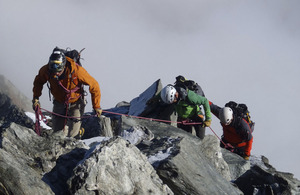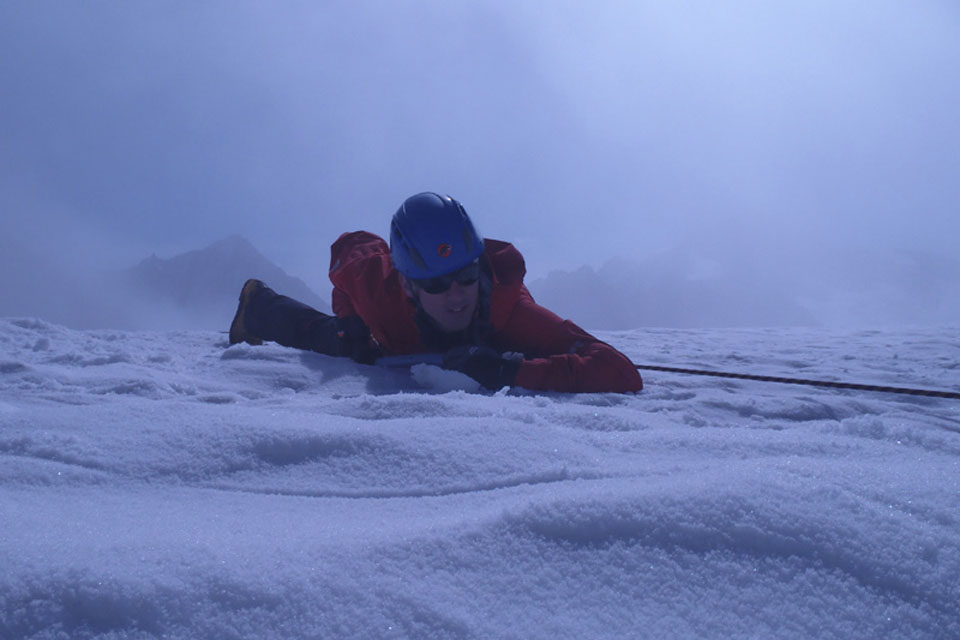Tri-Service team prepares for Antarctic expedition
The first mission rehearsal exercise for the 24 men and women who will take part in the British Services Antarctic Expedition (BSAE) 2012 took place in Switzerland this summer.

Sergeant Will Brant, an Army Physical Training Instructor, training a group to become Alpine Mountain Leaders, during the Joint Services Alpine Meet [Picture: Crown Copyright/MOD 2011]
The two-month expedition, which will set off at the end of December this year, will be led by Lieutenant Colonel Paul Edwards, Royal Logistic Corps, and will be the first Joint Service expedition mounted to the mainland of the Antarctic Peninsula by the UK Armed Forces.
It follows three Joint Service expeditions to explore Antarctic ‘islands’ Elephant, Brabant and Smith, and three recent British Army expeditions, in 2001, 2004, and 2007, continuing a series of responsible, ethical and ecological expeditions to the area.
The expedition will form the key element of the British military contribution to mark the 100th Anniversary of Captain Scott’s endeavours on Antarctica.
Unlike other expeditions seeking to follow in Scott’s footsteps, in 2012 the BSAE will travel in the spirit of Scott, but not in his tracks.
Instead, and very much in the ethos of Scott’s 1910-1913 expedition, the BSAE’s aim will be: ‘to conduct scientific exploration in remote areas of the Antarctic Peninsula, seeking to further the bounds of human exploration and knowledge.’
The expedition will seek to conduct the scientific exploration in the Peninsula Arm of Antarctica, an area which is warming faster than anywhere else on the planet. Amongst other things, this science will contribute to an understanding of the factors influencing this rapid warming.
Various activities will be undertaken to ensure the science activity is linked to an educational outreach programme to inform and educate the general public and, in particular, primary and secondary school students.
The team, which consists of 12 members of the Army, six members of the Royal Navy, and six from the RAF, have a large amount of training to undertake before they set off, and this July saw the first of two mission rehearsal exercises.

Captain Ivar Milligan, Scots Guards, practising crevasse rescue techniques during training on Mission Rehearsal Exercise 1 in the Swiss Alps [Picture: Crown Copyright/MOD 2011]
In order to train in a challenging environment, and to prepare them for the rigorous challenges that the Antarctic will present, the team deployed to the tough glaciers and crevasse fields in the Saas Fee region of the Swiss Alps.
The first week began with alpine walking in crampons, navigation and survival skills in the extreme environment of several 4,000-metre peaks and the unseasonably harsh weather of the Alps. The team utilised this time to ‘shake out’ and brush up on their Alpine Leadership skills, and also to gain a few additional qualifications.
The training was collocated with, and ran concurrently to, the Joint Services Alpine Meet 2011. This arrangement allowed for joint training and a better transference of the immense amount of experience and knowledge that such a meet produces and fosters.
Week two moved forward into some more mission specific training.
Firstly, Lieutenant Colonel Pete Davies, of the Royal Army Medical Corps, and Surgeon Lieutenant Commander Si Hornby RN gave the team lessons in remote medicine and dealing with cold weather injuries which will be particularly important with temperatures on the Avery Plateau expected to fall as low as minus 40 degrees Celsius.
Captain Sam Marshall, Army Air Corps, then provided instruction in the use of pulks (sleds that are towed behind winter travelers with rigid pole systems and harnesses), but more importantly, in crevasse rescue, which will be critical as this is expected to be the major danger in the hitherto unexplored areas that the team will be entering.
Kate Simmonds, an RAF Search and Rescue pilot based at RAF Valley, was up next, providing instruction in advanced rope techniques which will be an essential skill when conquering some of the unexplored mountain ranges and ice routes that the team will find on their expedition.
Finally, Lieutenant Commander Martin Densham RN provided training on ice-coring, which is an essential part of the expedition as, with no fewer than eight separate scientific experiments supporting several different universities and scientific organisations, the team will be focused heavily on scientific research.
The expedition will sail from Chile in the 75-foot (23m) yacht Australis in late December 2011, and cross the infamous Drake Passage to the Antarctic Peninsula. Once on the peninsula the expedition will follow Scott’s model and set up a base from which to mount exploration and conduct forays into remote areas of the Peninsula.
The expedition also plans to make a series of daring ascents of previously unclimbed mountains in the region.
The expedition aims to maintain the long tradition of the Armed Services’ involvement in exploration and, in particular, that of Polar science exploration, the essence of which is captured so well by Tennyson in his poem Ulysses - ‘To strive, to seek, to find, and not to yield.’
After news of Scott and his team’s demise reached the UK, funds were contributed by the public to look after the families of the heroic explorers. In keeping with this sentiment, the BSAE 2012 aims to raise £10,000 for the charity Help for Heroes.
For more information about the team, and to follow their exploits, you can visit their website or follow them on Facebook; see Related Links.